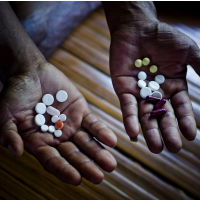Shortage Looms of Critical HIV Medicine Due to Red Tape
 A patient in Manipur holding his medicines (file photo: Sami Siva, Médecins Sans Frontières)
A patient in Manipur holding his medicines (file photo: Sami Siva, Médecins Sans Frontières)
According to a media report, India could run out of an important medicine in the country’s free HIV/AIDS drugs programme by October 21 due to bureaucratic bungling, leaving more than 150,000 patients without life-saving drugs for about a month.
As drugs in the open market are expensive, the government provides more than one-sourced from pharmaceutical companies via a tender process.
Reuters reports that delays in approving such tenders has left the National AIDS Control Organisation (NACO) scrambling to secure supplies of tenofovir/lamivudine tablets that are prescribed to thousands of patients during initial stages of treatment.
"We are also fed up. What to do? There are so many bureaucratic hurdles. The file goes to so many tables, and so many comments," NACO Deputy Director General A.S. Rathore told Reuters.
He said NACO had raised the demand for supplies in January, but according to Reuters the tender for the medicine was approved only last week. Supplies normally take at least 60 days to reach patients, which in this case would take it to late November.
Patients and activists complained of shortages of several HIV drugs in September, forcing one group to send a legal notice to Health Secretary Lov Verma. Verma directed NACO to take stock of the programme and told Reuters on September 4 that the situation was not as grave as activists described.
However, Rathore said this week that the programme had only 1.6 months of tenofovir/lamivudine tablets in stock on September 4, i.e. supplies would run out by October 21.
And data available on NACO's website shows that, on Sept. 24, 10 states had less than a month of stocks of such tablets. NACO is now leaning on companies to help avert a crisis, but they are not yet in a position to provide the medicine.
Hetero Drugs, a manufacturer that has been awarded the contract under the latest tender, blamed NACO for a lack of planning and delaying the approval process.
"I have all the respect for our ministries, but when you're looking at HIV patients, who can't be deprived even for a single day, this is not an effective way of handling the system," said the unnamed executive.
Missed dosages for long durations could increase patients' drug resistance and result in a faster spread of the virus.
According to the U.N. AIDS programme, India had the third-largest number of people living with HIV in the world at the end of 2013. The previous year, 140,000 people died in India because of the disease.
The government has been providing free antiretroviral drugs for HIV treatment since 2004, but the World Health Organisation believes that only half of those eligible for the treatment received it in 2012.
To Learn More:
India set to run out of critical free drug for HIV/AIDS programme (by Aditya Kalra, Reuters)
- Top Stories
- Controversies
- Where is the Money Going?
- India and the World
- Appointments and Resignations
- Unusual News
- Latest News
- India College Chain’s Expansion into U.S. Draws Opposition from Massachusetts Officials over Quality of Education
- Milk Shortages in India Tied to Release of New Movies Featuring Nation’s Favorite Stars
- Confusion Swirls around Kashmir Newspaper Ban in Wake of Violent Street Protests
- Polio-Free for 5 Years, India Launches Vaccine Drive after Polio Strain Discovery
- New Aviation Policy Could Increase Service, Lower Ticket Prices






Comments